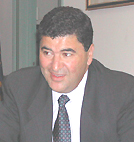 |
|
Elias
Zerhouni
|
Nary a sensitive issue went unnoticed in Elias Zerhouni’s opening remarks at the December 16 NIH director’s town hall meeting.
In a kind of good news–bad news delivery, Zerhouni counted off some of the more salient happenings since the last town hall session in June. On the positive side:
![]() The home teams won both the major A-76 competitions for NIH jobs.
The home teams won both the major A-76 competitions for NIH jobs.
![]() The public launching of the road map for medical research at NIH—at
a National Press Club press conference attended by 54 reporters—received
very positive coverage that affirmed NIH’s preeminence in medical
research management, funding, and creative thinking.
The public launching of the road map for medical research at NIH—at
a National Press Club press conference attended by 54 reporters—received
very positive coverage that affirmed NIH’s preeminence in medical
research management, funding, and creative thinking.
![]() And NIH received a highly gratifying leadership award for best practices
in achieving diversity in the workplace, the only federal agency among
the ten national honorees.
And NIH received a highly gratifying leadership award for best practices
in achieving diversity in the workplace, the only federal agency among
the ten national honorees.
On the downside, Zerhouni continued, there were some disparaging allegations about NIH priorities, peer review, and scientist integrity:
![]() In letters and at a congressional hearing, some members of Congress expressed
distaste for NIH funding of behavioral research related to HIV and other
sexually transmitted diseases, drug abuse, sexual dysfunction, and sexuality
in general.
In letters and at a congressional hearing, some members of Congress expressed
distaste for NIH funding of behavioral research related to HIV and other
sexually transmitted diseases, drug abuse, sexual dysfunction, and sexuality
in general.
![]() A package of articles in the L.A. Times targeting outside consulting
by NIH scientists as a conflict of interest that threatens research integrity
has generated congressional inquiries and a review by NIH of related policies
and practices.
A package of articles in the L.A. Times targeting outside consulting
by NIH scientists as a conflict of interest that threatens research integrity
has generated congressional inquiries and a review by NIH of related policies
and practices.
In the matter of sex-related research, Zerhouni recounted his response to those who questioned the appropriateness of NIH priority-setting mechanisms: "I stated that the peer review process at NIH is the envy of the world, that NIH addresses the full spectrum of public-health problems, and that the burden of sexually transmitted disease is a major public-health issue that NIH will not shy away from."
He emphasized, however, that when questions regarding NIH stewardship of public money are raised, they must not be brushed aside. The burden of proof, he said, is on NIH to lay out exactly why a questioned research project is important to the public health and not a frivolous expense. It should also be noted, he added, that NIH does not make decisions in a vacuum, but has thousands of individuals "advising us."
That same degree of openness and self-scrutiny must be brought to bear in responding to the newspaper allegations of unethical conflict of interest in the consulting activities of some NIH scientists—the story’s "exaggerations and innuendo" notwithstanding, Zerhouni said.
In the matter of consulting in general, Zerhouni observed that it is desirable that the work and ideas of NIH scientists are of a caliber that their help would be sought beyond NIH, in accordance with one of NIH’s essential obligations—to ensure that its science is translated into tangible public benefit.
But such exchanges, he said, must be transparent, with no conflict of interest, real or perceived. "We cannot afford to have our public trust diminished, or [to risk losing our ability] to attract the best and the brightest" . . . .If there is a question, my job is to bring maximum light to it—and to ask, ‘how can we do this better?’" he said.
An initial review of the documents related to the various consulting arrangements highlighted in the newspaper coverage leaves "no doubt that government ethics rules were followed," Zerhouni said. But he suggested that adhering to the rules might not be enough. Just because the "Ts are crossed and the Is dotted," he observed, does not necessarily mean that the public trust will be preserved.
"We will be proactive," Zerhouni said, "to avoid even the perception" of conflict. He said that NIH will conduct more internal reviews and is convening an inside Central Ethics Advisory Committee—and an outside blue ribbon panel to explore the issue thoroughly.
Other speakers addressed issues related more to the logistics of navigating NIH (see DDIR column, "Where to Find Help at NIH").
A future town hall
may focus exclusively on science at NIH, Zerhouni said. ![]()